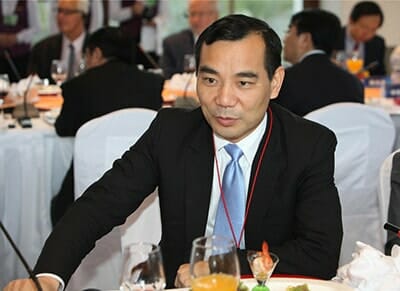
“And our latest product combines life insurance with an industry-leading yield, plus apparent exemption from many major regulations.”
Beijing-based Anbang Insurance, which failed in a $14 billion bid to buy Starwood Hotels and Resorts this year, continued to draw attention in China’s financial world this month after new figures showed that the company controlled by entrepreneur Wu Xiaohui nearly quintupled its premium income in June, compared to the same month last year.
Anbang thrust itself onto the world stage in late 2014 with its $1.95 billion acquisition of the Waldorf Astoria hotel, but more recently the 12-year-old insurer has been drawing attention for the rapid rise in its sales and the high-risk nature of some of the products it is marketing to retail investors in China.
Retail Investors Turn to Wealth Management for Yield
The China Insurance Regulatory Commission (CIRC), which regulates the insurance industry, has recently been warning insurers about selling short term insurance policies which double as wealth management products. Largely unable to invest beyond China’s borders, and faced with a state-run banking sector which pays less than 0.5 percent interest on savings accounts, Chinese individual investors now regularly turn to opaquely structured high yield wealth management products as a source of investment return.
Despite new restrictions on sales of such hybrid insurance policies, however, Anbang has reportedly been marketing high yield products aggressively to help fund its overseas acquisition drive. Sales of what the industry calls “universal insurance,” which combine death benefits for policy-holders with short term investment yields, were the primary source of Anbang’s nearly five-fold increase in premium income in June, after its sales of high-yield hybrid policies jumped 16-fold this year.
Some of Anbang’s products “guarantee” a 4.58 percent yield on a two-year investment, according to a recent report in Caixin, while competitors are generally restricted to a offering a maximum 3.5 percent return unless they receive approval from the CIRC. Anbang also does not require downpayments on its wealth management policies, and the policy studied by Caixin had no penalty for early withdrawal.
Anbang’s revenue from sales of insurance products reaching RMB 34.1 billion ($5 billion) in June, according to the latest data from the CIRC.
Meanwhile a spokesman for the China Securities Regulatory Commission (CSRC), which regulates the country’s stock markets, on Friday publicly criticized Shenzhen’s Baoneng Group for its use of “high risk” financing in its drive to take over China Vanke, the country’s biggest developer.
Reports of Investigation Fail to Slow Anbang
The CIRC was said in May to have started an investigation of Anbang and the stability of its financing methods, but based on the company’s June results, that reported scrutiny has not stopped the insurer from building up its war chest for further acquisitions. Wu is married to a grand-daughter of former Chinese supreme rule Deng Xiaoping and is said to have benefitted from her family’s political connections during his meteoric rise.
Anbang’s high-yield-led sales reached RMB 228 billion in the first six months of this year, ranking behind state-owned giant China Life which brought in RMB 383 billion.
During March the CIRC outlawed sales of insurance policies with durations of less than one year, and restricted the sale of policies with durations of less than three years. Since that time many smaller insurers, including Baoneng subsidiary Foresea Life Insurance, saw their sales drop rapidly, with Foresea’s June premiums down 42 percent compared to the same month last year.
Leave a Reply